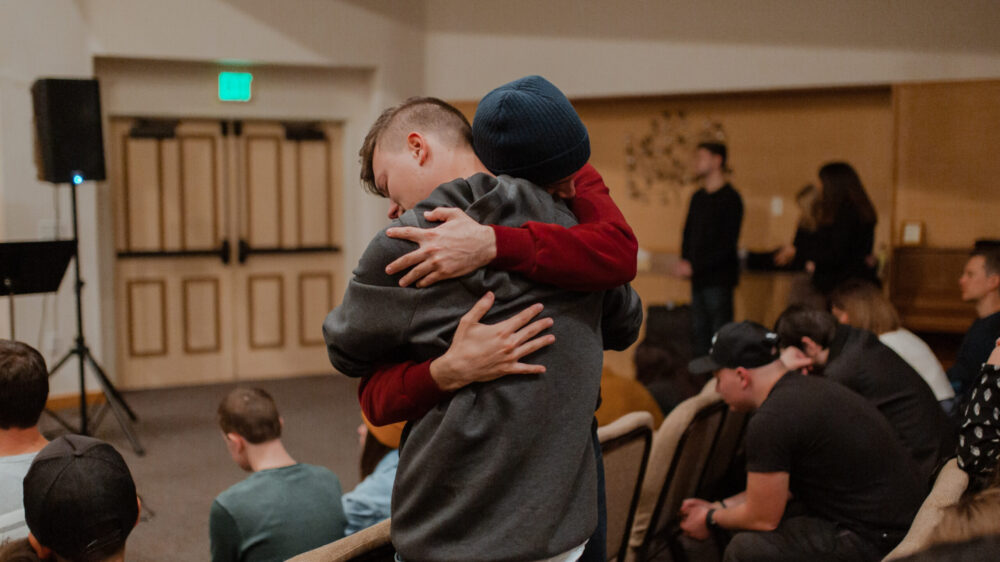A Life-Changing Encounter
On a regular Monday morning, I received an email from Margaret, one of our missionaries serving in the Middle East. Margaret was in over her head, and she needed our help. She had recently befriended Halima, and through months of deep friendship and faithful proclamation of the gospel, Halima had come to believe in Jesus and become a follower of Christ. It was a beautiful thing.
But as Margaret and Halima became closer in friendship and discipleship, Halima started to reveal that she had experienced significant trauma in her young life, leading her to the end of her rope and searching for hope. In fact, the day Margaret met Halima was the day Halima had decided to end her own life because of the pain she was experiencing. By God’s divine plan, instead, she met Margaret at the beach, who spoke with kindness and expressed genuine interest in Halima’s life. That day, Halima heard about Christ for the first time and had an inkling of hope, enough to want to know more.
Margaret quickly realized that she was not equipped to navigate the depth of trauma Halima had experienced. At this point, she did not know what to do to help her friend, and Margaret was beginning to experience secondary trauma herself. She reached out to ask what she should do. As a church leader, in this moment, I realized that we had spent years developing Margaret and her husband to be equipped in language, culture, how to share the gospel, and a successful strategy for planting churches — but we had not fully equipped them with the tools needed to care well for those they would meet. We began to scramble for cross-cultural resources and started having broader conversations about the need to equip ourselves, as church leaders, and our people.
Becoming a Trauma-Informed Church
A trauma-informed church is a powerful thing. Adopting trauma-informed approaches and practices within your church’s foster care ministry is a continuous journey to compassionately loving our neighbors. It’s a journey that requires a dedicated, holistic approach to equipping and educating elders, pastors, church staff, volunteers, and congregation members with the knowledge and skills to comprehend the origin of trauma and the effects it has on every single human being living within that community.
In general, many churches and ministries struggle to become truly trauma-informed, not for lack of desire, but because they lack access to trauma-informed care training and practical ministry tools. Most churches, including those I have had the privilege of serving in, would say they value it and even have pockets of trauma understanding and care. Where I recently served on staff, our foster and adoptive families were the most trauma-informed. This awareness was imperative to their success and survival. The minister on staff who cared for these families had a vision to develop healthy families. This minister was determined to resource families with ongoing trauma-informed training, equipping them to care for the foster children and youth they had welcomed into their homes.
However, we soon discovered that the same training was also needed for those serving in our congregation. I remember talking to an adoptive mom at our church who had decided it just wasn’t worth putting her 4-year-old son into the preschool on Sunday morning. At some point each week, she would be called to pick him up because he was disrupting the class, and the teachers didn’t know what to do with him. I remember the pain in her voice when she asked me, “how can a church that has a culture of adoption not have leaders who work to understand that his needs are a bit different?”

I also recall a conversation with a member of our student ministry staff who expressed a need for additional training because foster youth were attending small groups and getting involved. He wanted to make sure they were effectively ministering to these students and meeting their needs, but he had no idea where to start.
Something was missing. We were challenging people from the Word to make disciples, care for the vulnerable, and support foster care and adoption, yet our faith family wasn’t fully equipped with trauma-informed care principles to welcome and support those groups effectively. We were missing opportunities to strengthen believers, effectively love our neighbors, and make disciples, because we were not fully aware of trauma in our own faith community.
Since then, by God’s grace, there has been a pursuit to become more aware, where pastors and leaders intentionally apply trauma-informed care across every area of ministry. I know of many churches throughout the world that are on the path to becoming trauma-informed, faith communities. The fruit God is bringing about in these faith communities is something only He can receive glory for. A healthy church on the journey of becoming trauma-informed is a powerful thing. Trauma-informed churches often share a few distinguishing characteristics:
- Committed pastors and church leaders who pursue ongoing education and awareness about trauma and its effects.
- Regular rhythms for all church staff, lay leaders, and volunteers to receive training on how to recognize and respond to trauma. Being trauma-informed is, at its core, a relational approach. And, at its core, the church is a place for relationships — a relationship to God and other people. This means people need training on how to show empathy, compassion, and care well for those around them.
- A culture that asks, “what happened to this person?” rather than asking, “what is wrong with this person?”
- A trauma-informed approach to pastoral care.
- Clinical counseling services for those who have experienced trauma.
- An integrated approach for evaluating and applying trauma-informed principles to the programmatic aspects of ministry in the church. For example, this might practically look like equipping preschool workers with tools to care for children who have experienced trauma or designating spaces to accommodate those impacted by trauma.
- A culture of prayer, preaching and biblical teaching that includes trauma-sensitive topics on spiritual warfare. Trauma-informed churches understand where the fight actually is (Eph. 6:12). This awareness is critical for equipping the saints to live sustained, overcoming lifestyles.
- Healthy strategies to help leaders thrive and prevent ministry burnout.
- Awareness of cultural influences on mental health and how to strengthen those in local and global missions.
- Strong community partnerships that are trauma-informed and aligned with biblical values, to resource individuals and families long-term.
- Consistent efforts to address the issues faced throughout the church and community, alongside a commitment to care for their community and break down stigma.

People find healing and restoration through the gospel. The local church is vital in supporting individuals who have experienced or are facing trauma. Research done by The Centers for Disease Control and Prevention (CDC) says that about 64% of U.S. adults report experiencing at least one type of traumatic event or adverse childhood experience (ACE) before age 18.1
The ability to know and understand the complexities of trauma and the effects it has on us as people is a kindness from God. The fact that we, as His church, can be made aware of how to practically love our neighbors better is also a kindness from God.
As the people of God, we are expected to enter the spaces where suffering and hurting people are. May we be a people who reach out to the suffering, empowered by the Spirit of God and equipped with rich tools for engaging well. A trauma-informed church can be a powerful conduit to transform entire communities and display the glory of God for all to see.

About the Author:
Callie Priest serves as the Director of Strategic Partnerships for WinShape Homes. Prior to joining the leadership team at WinShape Homes, Callie served in Global Strategy and Partnership Development at The Church at Brook Hills in Birmingham, Alabama for over a decade. Throughout over twenty years of church ministry, Callie believes the church is the agent in which God accomplishes His mission and is passionate about helping the people of God connect with the purposes of God.
Works Cited
- “Fast Facts: Preventing Adverse Childhood Experiences.” Centers for Disease Control and Prevention, https://www.cdc.gov/violenceprevention/aces/fastfact.html.
